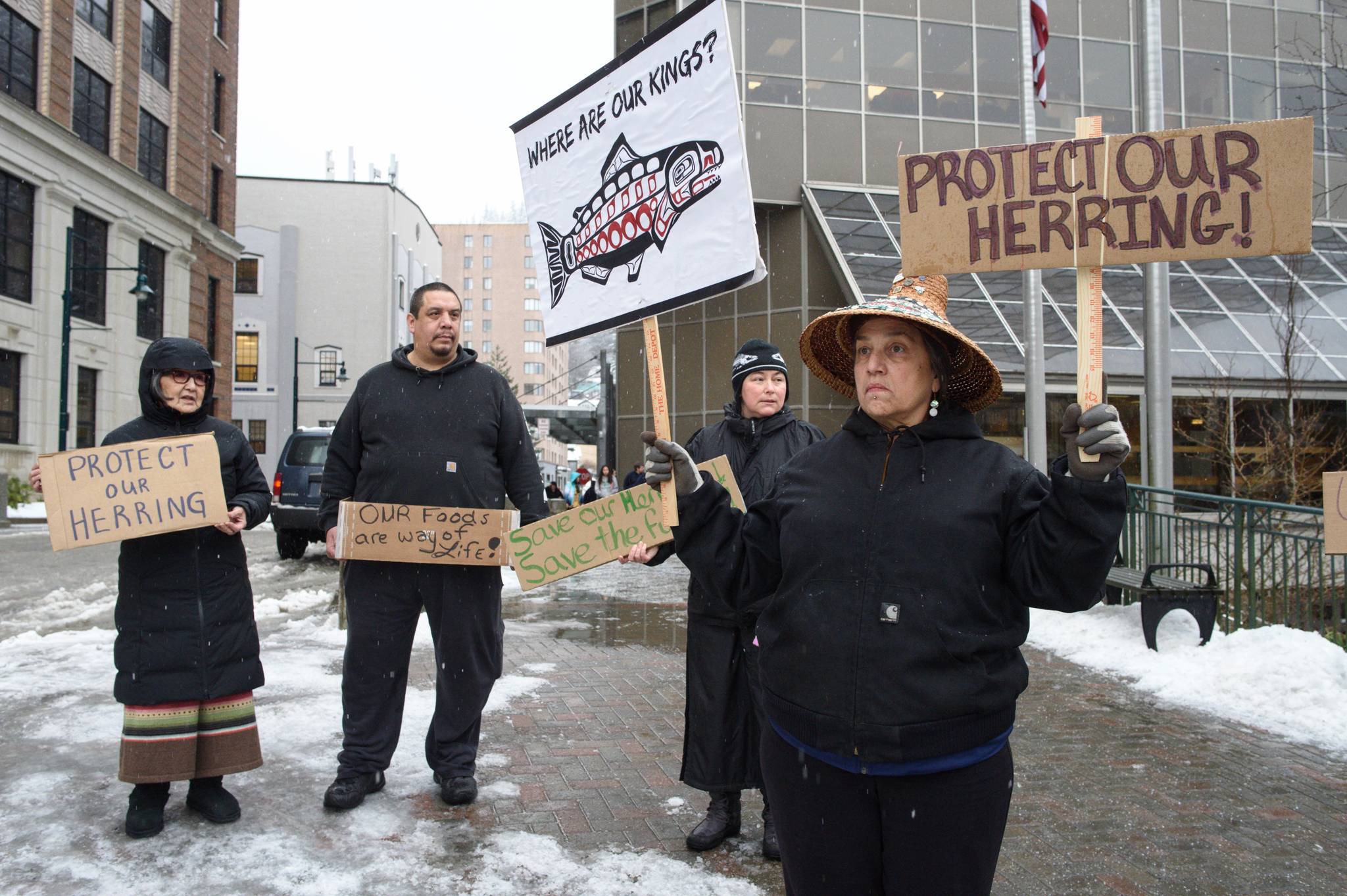More than a dozen people stood in front of Dimond Courthouse in Juneau on Tuesday, a cold sleet soaking their cardboard signs.
They were there to bring attention to a court hearing going on inside the courthouse. In December, the Sitka Tribe of Alaska filed a civil case against the Alaska Department of Fish and Game, looking to get the department to take better care of the herring fishery in Sitka Sound.
The herring population has been in decline in recent years, and the tribe has pushed for changes to the way the fishery is managed. In 2018, Fish and Game calculated the harvest for Sitka Sound to yield more than 11,000 tons of sac roe herring, but the actual harvest failed to even produce 3,000 tons, according to a fish and game report cited in court records.
Prior to that fishing season, in Jan. 2018, the tribe brought multiple proposals to the Board of Fisheries, including one (Proposal 99) to reduce the percentage of herring that commercial fishermen could harvest in Sitka Sound.
[Custody case goes before Supreme Court]
The tribe wrote in its proposals that overfishing in the commercial fishing industry was impeding the ability of subsistence fishermen who rely on herring roe, according to court records. The Board of Fisheries voted down Proposal 99 by a 5-2 vote, and multiple board members stated they believed the board’s regulations already provided “a reasonable opportunity for subsistence uses,” a phrase that is key to both the state’s and the tribe’s arguments.
Now, members of the tribe are looking to settle the issue in court. This early in the process, the two sides are still feeling each other out.
Seth Beausang, the lawyer representing fish and game, said in an email Tuesday that it’s not clear what exactly the tribe is asking for. Beausang said in the email and has written in court documents that the tribe “has repeatedly changed what it is asking for,” even in the short time since the case was filed in December.
“This case is at a very early stage,” Beausang said, “and the parties have not even begun to brief many important issues, such as the issue of reasonable opportunity for subsistence uses.”
Beausang wrote in a memo in the case that he believes the tribe’s concerns should be directed to the Board of Fisheries instead of going to court. Naomi Palosaari, the tribe’s lawyer, didn’t respond to requests for comment Tuesday to clarify what exactly the tribe was pursuing in the case.
Vivian Mork, a Tlingit citizen, did much of the speaking in front of the courthouse Tuesday. Mork — an occasional contributor to the Capital City Weekly — said the Tribe wants to reduce the percentage of herring that’s allowed to be taken commercially, but that doesn’t mean the Tribe is anti-commercial fishing.
“The Sitka Tribe of Alaska does understand that there are commercial fisheries and there is subsistence activity and we do feel that we should all be on the same side for the future of the herring, because you’re not going to have commercial fisheries if there are no more herring,” Mork said.
It was clear Tuesday morning that however it’s accomplished, preserving and growing the herring population in Sitka Sound is of the utmost importance to many in the region.
Among the demonstrators Tuesday was Sealaska Heritage Institute President Rosita Worl, who spoke passionately about the importance of protecting the herring population. The use of herring and herring roe in Alaska Native ceremonies is extremely meaningful, she said.
Worl added that the herring fishery in Sitka Sound is vital to people throughout Southeast and even along the coast down to Seattle.
“It’s not just a Southeast thing,” Worl said. “It affects the whole state, Alaska Natives wherever they live.”
[When Alaska salmon ‘go viral’]
The concerns of those on hand Tuesday extended beyond just herring and humans. Marvin Willard, a Tlingit resident of Juneau, said this harms salmon and other sea animals as well. Willard remembered his childhood, when he and his friends would cut a salmon open to see what the fish were eating.
Willard and his friends used to find herring or hooligan fish. Now, he sees many salmon with mostly empty stomachs. Diminishing herring numbers, he said, makes a difference to everything that eats or depends on herring.
“That cycle’s getting disrupted, so that’s going to have a chain effect to everything, right down to the rivers and the oceans,” Willard said. “To replenish all that, it’s not just for shorting the herring. We’re shorting everything else also.”
• Contact reporter Alex McCarthy at 523-2271 or amccarthy@juneauempire.com. Follow him on Twitter at @akmccarthy.

